高三英语上学期Unit15Youth-culture-(Reading)
- 格式:pdf
- 大小:2.01 MB
- 文档页数:9
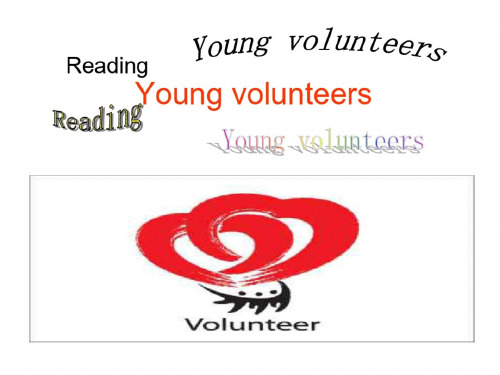
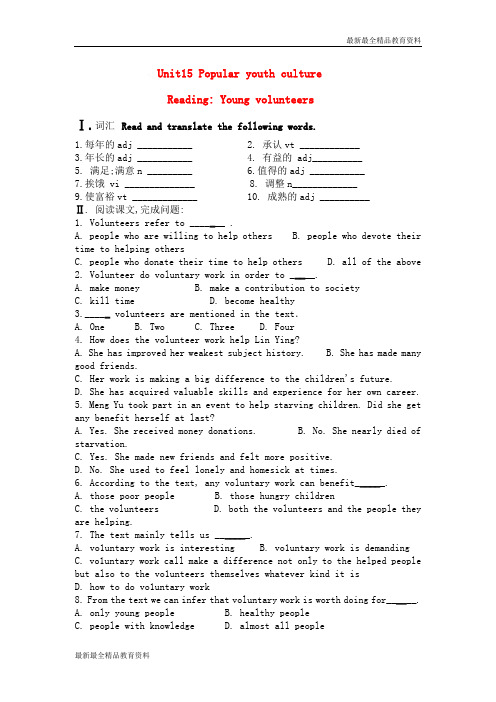
Unit15 Popular youth cultureReading: Young volunteersⅠ.词汇Read and translate the following words.1.每年的adj ___________2. 承认vt ____________3.年长的adj ___________4. 有益的 adj__________5. 满足;满意n _________6.值得的adj ___________7.挨饿 vi ______________ 8. 调整n_____________9.使富裕vt _____________ 10. 成熟的adj __________Ⅱ. 阅读课文,完成问题:1. Volunteers refer to _______ .A. people who are willing to help othersB. people who devote their time to helping othersC. people who donate their time to help othersD. all of the above2. Volunteer do voluntary work in order to _____.A. make moneyB. make a contribution to societyC. kill timeD. become healthy3._____ vo1unteers are mentioned in the text.A. OneB. TwoC. ThreeD. Four4. How does the volunteer work help Lin Ying?A. She has improved her weakest subject history.B. She has made many good friends.C. Her work is making a big difference to the children's future.D. She has acquired valuable skills and experience for her own career.5. Meng Yu took part in an event to help starving children. Did she get any benefit herself at last?A. Yes. She received money donations.B. No. She nearly died of starvation.C. Yes. She made new friends and felt more positive.D. No. She used to feel lonely and homesick at times.6. According to the text, any voluntary work can benefit______.A. those poor peopleB. those hungry childrenC. the volunteersD. both the volunteers and the people they are helping.7. The text mainly tells us _______.A. vo1untary work is interestingB. vo1untary work is demandingC. vo1untary work call make a difference not only to the helped people but also to the vo1unteers themselves whatever kind it isD. how to do vo1untary work8. From the text we can infer that voluntary work is worth doing for______.A. only young peopleB. healthy peopleC. people with knowledgeD. almost all peopleTrue or False1. In China, 13.5 million people are doing voluntary work.2. Being a volunteer brings not only social benefits but also personalbenefits.3. With the help of Mr Zhao , Lu Hao’s politics has improved a lot.4. After graduation, Lin Ying decided to apply for a job straight away.5. Lin Ying and other volunteer teachers helped more children pass the nationalexams.Ⅲ. 词组查找1.不断增长的数目________________2. 做出贡献 _______________3.个人利益 _______________4.给某人以帮助_______________5.集中于________________6.毕业于_______________________7.马上___________________ 8.渴望做某事 _________________ 9.为…筹集资金 ________________ 10.与…相适应 _______________Integrating skills Ⅰ.词汇Read and translate the following words.1. 制服n.___________2.便服的 adj.___________3.青少年n. __________4.近来的 adj.___________5.时髦的 adj. ________6.鉴于conj. ____________7.店主 n. ____________ 8.拥有vt. _____________Ⅱ.语篇理解1. The idea of blue trousers called jeans came from ______.A. EuropeB. AfricaC. AsiaD. America2. People began to buy jeans for fashion beside for work ______.A. in the 1900sB. in 1930C. in the 1930sD. in the 1920s3. ______ introduced jeans to the world.A. American governmentB. American soldiersC. American cowboysD. American workers4. From Text Two we can infer ______A. jeans will be less popularB. jeans will disappearC. jeans will still be popularD. jeans will be out of fashionⅢ. 词组查找1.穿上他们最喜爱的便服_________________2. 条纹牛仔裤______________3.过时_______________4.以…而闻名______________________5.在某人的业余时间___________________6.被介绍给世界______________7.赞同学生穿牛仔裤___________________ 8.用…来装饰 _____________9.…的象征____________________ 10.在许多方面__________________Reading1-8 DBCDCDCDFTFFT1.increasing numbers2. make a contribution to3.personal benefits4.give sb assistance5.concentrate on6.gratuate from7.straight away8.be eager to do sth 9. raise money for 10. fit in (with) Integrating skills1-4 ACBC1.put on their favorite casual clothes2.a pair of denim jeans;3.out of fashion4.have a reputation for5.in one’s free time6.be introduced to the world7.approve of students wearing jeans to school;8.decorate with 9.a symbol of 10. in many aspects。
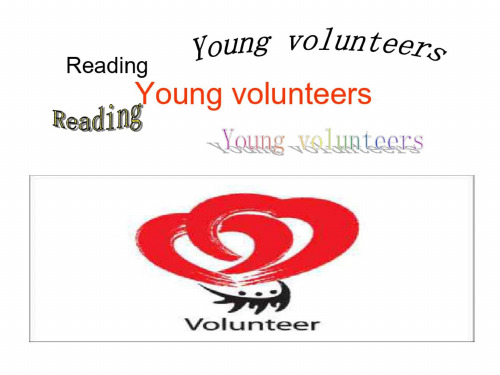
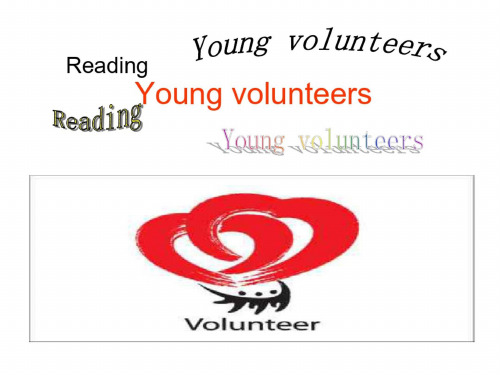
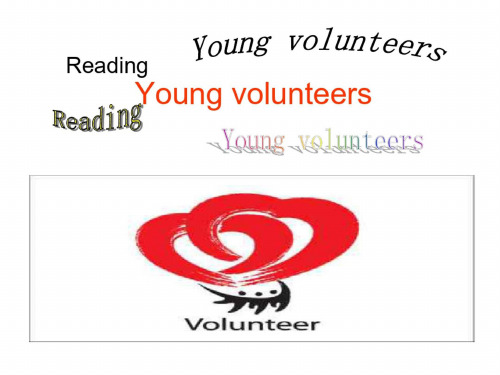
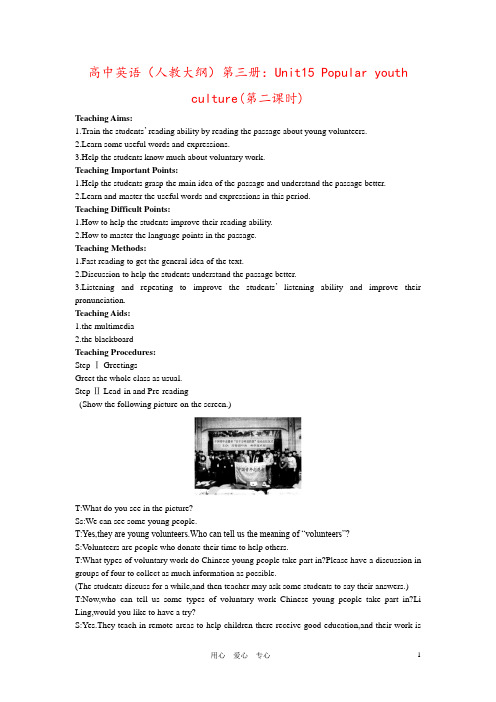
高中英语(人教大纲)第三册:Unit15 Popular youthculture(第二课时)Teaching Aims:1.Train the students’ reading ability by reading the passage about young volunteers.2.Learn some useful words and expressions.3.Help the students know much about voluntary work.Teaching Important Points:1.Help the students grasp the main idea of the passage and understand the passage better.2.Learn and master the useful words and expressions in this period.Teaching Difficult Points:1.How to help the students improve their reading ability.2.How to master the language points in the passage.Teaching Methods:1.Fast reading to get the general idea of the text.2.Discussion to help the students understand the passage better.3.Listening and repeating to improve the students’listening ability and improve their pronunciation.Teaching Aids:1.the multimedia2.the blackboardTeaching Procedures:Step Ⅰ GreetingsGreet the whole class as usual.Step Ⅱ Lead-in and Pre-reading(Show the following picture on the screen.)T:What do you see in the picture?Ss:We can see some young people.T:Yes,they are young volunteers.Who can tell us the meaning of “volunteers”?S:V olunteers are people who donate their time to help others.T:What types of voluntary work do Chinese young people take part in?Please have a discussion in groups of four to collect as much information as possible.(The students discuss for a while,and then teacher may ask some students to say their answers.) T:Now,who can tell us some types of voluntary work Chinese young people take part in?Li Ling,would you like to have a try?S:Yes.They teach in remote areas to help children there receive good education,and their work ismaking a big difference to the children’s future.T:Very good.Who has a different opinion?S:They also help the people who live alone.They help the elders living alone do shopping,do housework and sometimes read newspapers to them.The elders enjoy their company and they may feel more energetic and optimistic.T:I agree.Does anybody have anything different to say?S:Some volunteers help protect our environment.They plant trees,help people realize the importance of protecting rivers and animals.T:Well done!You’ve known a lot about voluntary work.We know each volunteer is making a contribution to our society.And there are also some advantages of being a volunteer.Do you know what they are?Have a short discussion with your partner to get more information.(A few minutes later,teacher asks some students to report to the class.)T:Wang Ning,please tell us some advantages of being a volunteer.S:Being a volunteer can help the volunteer gain new skills and experience for his own career,and increase their chances of getting the job of their dreams.T:Good.Please sit down.Liang Hong,what’s your opinion?S:Being a volunteer can make more friends,build confidence and also enrich one’s life.Step Ⅲ ReadingT:That’s quite right.Today we’ll read a passage—Young V olunteers.Please read the passage quickly and then answer the questions on the screen.(Show the following questions on the screen.)1.According to the passage,what’s the reason why young people choose to do voluntary work?2.Lu Hao has chosen to volunteer on two evenings every week.How have Lin Ying and Meng Yu chosen to give their time?Why have they made different choices?(A moment later.)T:Have you found the answers?Ss:Yes.T:Now,who can tell us your answer to the first question?S:Let me try.Young people choose to do voluntary work because they want to make a contribution to society,and they also know that being a volunteer brings many personal benefits.T:Great!Please sit down.Now,let’s look at the second question.Who can tell us how Lin Ying has chosen to give her time?S:She has chosen to spend a year in a remote part of southwest China working as a volunteer teacher in a village school.T:That’s quite right.How about Meng Yu?S:Meng Yu finds time for voluntary activities during the weekends.T:Why have they made different choices?S:Because Lin Ying just graduated from university,and she didn’t apply for a job straight away.Meng Yu is studying for her master’s degree in Canada.She has a busy timetable.Step Ⅳ ExplanationT:Good job.To help you understand the passage better,I’ll explain some useful words and expressions to you.Look at the screen,please.Listen carefully and take notes.Words and expressions:1.acknowledge vt.①admit②express thanks fore.g.He refused to acknowledge that he was defeated.We must not fail to acknowledge the professor’s help.pany n.being together with another or otherse.g.I enjoy his company.I’m glad/grateful of your company.3.apply v.①make a formal request②fit;be suitable/usefule.g.They applied for an extension for their visas.He applied to return to his motherland.The rule doesn’t apply to middle school.4.straight away/off:without hesitation/delaye.g.I can’t tell you straight away/off.I told her right/straight away/off what I thought of her.5.fit in:be in harmony with sb./sth.e.g.You can’t bring outsides into a place like this;they won’t fit in.You should fit in with other employees.(Explain the words and expressions to the students and write them on the blackboard.)Step Ⅴ Further UnderstandingT:From the passage we know the voluntary work can benefit both the volunteers and the people they are helping in many ways.Now,go through the text and list all the benefits mentioned in the passage.(A moment later,teacher asks some students to write their answers on the blackboard.Cf:The Design of the Writing on the Blackboard.)Step Ⅵ Listening and ReadingT:Good.I think you’ve understood the passage well.Now,let’s listen to the tape.Listen carefully the first time I play the tape for you and read after the tape the second time the tape is played.Pay special attention to your pronunciation and intonation.(Play the tape twice for the students to listen to and follow.Then if time permits,ask some students to read the passage.Help the students to improve their pronunciation and intonation.)Step Ⅶ DiscussionT:We know that young people all over the country are doing voluntary work.What volunteering projects do you know about in our area?How do you think these benefit the young people who are involved in them?Have a discussion in groups of four to collect as much information as possible.(The students discuss the questions for a while.Then teacher asks several students to say their answers.)T:Who can tell us about the volunteering projects in our area?S:In our area,some volunteers are planting trees and protecting trees.Others are helping people learn English,and still others are providing law assistance for people who can’t afford to pay for a lawyer.T:How do you think these benefit the volunteers?S:V olunteers can gain valuable experience,build confidence,good communication skills and leadership ability.T:Excellent.Maybe some of you have more to say.You can write them down after class.Step Ⅷ Summary and HomeworkT:Today,we’ve read a passage about young volunteers.We know that volunteers are making contributions to our society,and the voluntary work can also benefit the volunteers.Maybe we should also think about doing some voluntary work in our spare time.After class,try to use the useful words and expressions we’ve learnt today more to master them better.Remember to preview the next part:Language Practice.So much for this period.Class is over.See you next time!Ss:See you!Step Ⅸ The Design of the Writing on theBlackboardUnit 15Popular youth cultureThe Second PeriodⅠ.Useful words and phrases:words:acknowledge company applyphrases:straight away/offfit inⅡ.Benefits to(1)volunteersgain valuable experience;build self-awareness,confidence,good communication skills and leadership ability;make more friends;gain new skills;increase their chances of getting the job of their dreams;...(2)people helpedfeel more energetic and optimistic;needn’t worry about housework;can get good education and have a different and better future;...Step Ⅹ Record after Teaching_______________________________________________________________________________ ___________________________________________________________________________。
人教版高三Unit 15 Popular Youth CulturePeriod 1 Words and ExpressionsAims:1.Enable Ss to read the words correctly.2.Learn the usages of the following words.Precedures:Step1Pre-learning Fill the blanks with the changeable words1.voluntary(n)________________2.beneficial(v)___________________3.satisfaction(adj)______________ (n)_________________munist(n)_________________5.donation(v)_______________6.adjust(n) __________________7.rich(v) ________________8.recent (adv) ________________ 9.fashion (adj)_________________10.possess (n)__________________ 11.melt (pt,pp) _________________12.enthusiasm (adj) _______________ 13.week (adj) _______________13.breath (adj) ________________ 14.starve (n) ______________Step 2 Words1.acknowledge vt. 为…表示感谢;承认(1) acknowledge +n Do you _________defeat?(2)acknowledge doing对手们承认输了. The opponents____________ having been defeated.(3)acknowledge +n. +as /to be…认为…是…I ____________your statement to be true.He is_____________ to be one of the greatest writers.(4)acknowledge thatThe opponents _____________that they were defeated.可跟动词ing形式的动词及词组(熟记)admit appreciate avoid consider cannot help delay deny dislike enjoy escape excuse feel like finish forgive give up imagine keep mention mind miss postpone put off practise resist risk suggest2. Company n. 1) 友谊;交情;陪伴他陪伴我。
高三英语Unit 15 –Popular Youth Culture人教版【本讲教育信息】一. 教学内容:Unit 15 –Popular Youth Culture二. 知识总结与归纳:课文重难点句解析1. On the annual International V olunteers Day, the world acknowledges the work of millions of people who give their time to help others.在每年的国际志愿者日,全世界都要对那些献出时间来帮助别人的数百万志愿者表示感谢。
acknowledge:为……表示感谢;承认。
后面接名词;动名词和从句Do you acknowledge defeat ?The opponents acknowledged having been defeated.The opponents acknowledged that they were defeated.2. Around 24,000 Young V olunteers Community Service Station in China are welcoming increasing numbers of Chinese youth who want to make a contribution to society, and the work they are doing is important.在中国有大约24,000个青年志愿者社区服务站正在欢迎越来越多想为社会作出贡献的中国青年来加入。
an increasing number of …越来越多的……make a contribution to …:对……作出贡献(后面接名词或动名词)Thomas Edison made a great contribution to the world.It is our duty to make a contribution to protecting the environment.to 作为介词后面接动名词的短语有:get used to…; be addicted to…; lead to…; be related to…; devote … to…; look forward to…; stick to…; access to….3. …each contribution—no matter how small—can help make a difference.每一次贡献不论多么小,都能产生影响。
Unit 15 Popular youth culturePart 1 Teaching PlansGoals◆Talk about popular youth culture and interests of young people◆Read about voluntary work◆Practise presenting idea◆Integrative language practice◆Conduct a survey and write a reportPeriod 2 Let’s read!(YOUNG VOLUNTEERS)Goals◆Read about young volunteersProceduresStep 1: Pre-readingGood morning, class! Before we read the article Young V olunteers, let’s first discuss and answer the two pre-reading questions on page 129. (suggested answer: opportunities in the humanitarian, educational, agricultural, environmental fields, such as working for churches, hospitals, communities, the poor, the disabled, the lonely old, etc.)Step 2: Reading and answering questionsNow skim the text and find what kind of voluntary work Lu Hao, Lin Ying and Meng Yu take part in.(Key: Lu Hao does voluntary work by visiting and helping an old man in the local community. Lin Ying is a volunteer teacher in a village school, serving her national community. Meng Yu does voluntary work for an international project.)Next, let’s follow the tape and find out the personal benefits that doing voluntary work gives us.(Key: Lu Hao has improved his history lessons a great deal. Lin Ying is acquiring valuable skills and experience for her own career. Meng Yu has made new friends from different backgrounds and has realized how lucky she is to have enough to eat and a chance to get a good education and this experience has given her the motivation to succeed.)Step 3: Reading and checkingNow, please read the text again and do the following true or false questions:1.In China, 13.5 million people are doing voluntary work.2.Being a volunteer brings not only social benefits but also personal benefits.3.With the help of Mr Zhao, Lu Hao’s politics has improved a lot.4.After graduation, Lin Ying decided to apply for a job straight away.5.Lin Ying and other volunteer teachers helped more children pass the national exams.6.To raise money for starving children in some least developed countries, the local newspaper and TV organizedan event to go without food for 30 hours.7.All the three volunteers felt doing voluntary activities beneficial.(Key: F T F F T F T)Step 4:Having a discussionPlease discuss the next two questions in groups of four. Then, I’ll ask you to report it.1)Why do you think they choose to be volunteers?2)What kind of voluntary work are you most interested in? Why?Step 5:Reading and underliningSupplementary reading:Volunteers, volunteer service and volunteerismV olunteers志愿者The term “Volunteers” refers to individuals or groups of individuals who contribute their personal time and energy to social improvement by providing services based on morality, ideal, conscience, sympathy and responsibility without aiming at seeking material remuneration.The term “volunteer service”refers to non-profit and non-occupational behavior of aid provided for one’s。